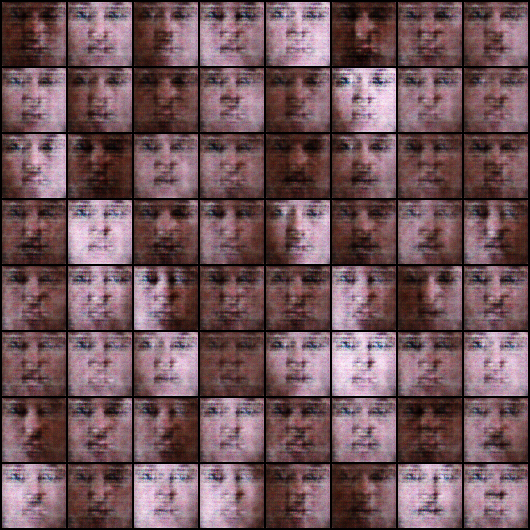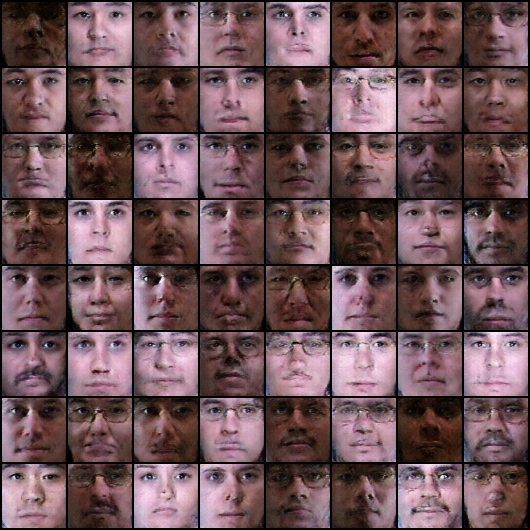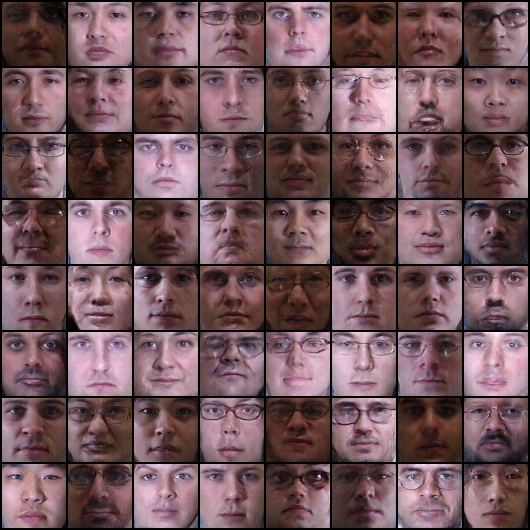DCGAN¶
DCGAN stands for deeply convolutional GAN, and is described in the following paper [dcgan]:
@InProceedings{radford-iclr-2016,
Author = {Radford, A. and Metz, L. and Chintala, S.},
Title = {Unsupervised {R}epresentation {L}earning with {D}eep
{C}onvolutional {G}enerative {A}dversarial {N}etworks},
BookTitle = {Intl {C}onf. on {L}earning {R}epresentation},
seq-number = {50},
year = 2016
}
Also, most of the code (architecture and training) has been borrowed here.
Here, the goal is to generate images of frontal faces. You can train a model using the MULTI-PIE database by using the dedicated script, and a proper configuration file. The configuration file should be as follow:
### DATA ###
from bob.learn.pytorch.datasets.multipie import MultiPIEDataset
from bob.learn.pytorch.datasets import RollChannels
from bob.learn.pytorch.datasets import ToTensor
from bob.learn.pytorch.datasets import Normalize
import torchvision.transforms as transforms
dataset = MultiPIEDataset(root_dir='path/to/multipie/data',
frontal_only=True,
transform=transforms.Compose([
RollChannels(),
ToTensor(),
Normalize((0.5, 0.5, 0.5), (0.5, 0.5, 0.5))
])
)
### NETWORK ###
from bob.learn.pytorch.architectures import DCGAN_generator
from bob.learn.pytorch.architectures import DCGAN_discriminator
from bob.learn.pytorch.architectures import weights_init
ngpu = 1
generator = DCGAN_generator(ngpu)
generator.apply(weights_init)
discriminator = DCGAN_discriminator(ngpu)
discriminator.apply(weights_init)
Note
You should have the bob.db.multipie package installed on your environment. Note also
that this model acts on color images of face of size 64x64. It’s up to you to preprocess
your data to make them fit these constraints …
Once your configuration file is done. You can learn a model to generate frontal face images by invoking the following script:
$ ./bin/train_dcgan.py configuration.py -vv
If you have access to a GPU, you should run the script using this option:
$ ./bin/train_dcgan.py configuration.py -vv --use-gpu
Note that this script will consider frontal faces only (but all illumination conditions).
Generated samples will be saved after each training epoch. You can specify where to write
images using the --output-dir option (default to ./dcgan).
Here are some examples of saved images.

Fig. 1 After 1 epoch¶

Fig. 2 After 5 epoch¶

Fig. 3 After 20 epoch¶